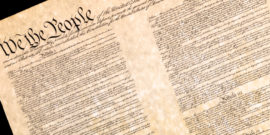Those who want space to pursue the common good in many of the ways that Vermeule promotes should be attracted to originalism.
Historians and Originalists Part III: The Hard Case of Discovering the Original Meaning of the 14th Amendment
In my last post, I want to discuss hard constitutional clauses – clauses where the original meaning of the constitutional provisions are extremely difficult to understand. In these cases, one might expect that the skills of the professional historian would be the most valuable. Yet, in the case of the 14th Amendment – in my view, the hardest part of the Constitution to understand its original meaning – recent discoveries have not primarily come from historians. Instead, originalists have a made a large number of important advances in this area. Thus, even in the hard areas, one cannot dismiss the methods of originalists, especially when conducted in the proper way.
Back in the 1980s before I became a law professor, I was first exposed to originalist interpretation of 14th Amendment. At the time, I thought the Privileges or Immunities Clause probably incorporated the Bill of Rights; the Due Process Clause was simply procedural due process, and the Equal Protection Clause provided for equality generally. Various people made these arguments and they seemed to make sense.
But then I remember reading through the congressional debates on the Amendment and having the toughest time. Members of Congress seemed to be saying the most absurd things. How could they be so confused?
Obviously, someone was confused but it wasn’t necessarily the members of Congress. I had come to the debate with preconceived notions about the meaning of the Amendment and somehow the debate did not conform to my ideas.
But that was back in the 1980s when the rebirth of originalism was in its infancy. Over time, as the movement and your author have matured, the obvious mistakes of that approach have been recognized. In particular, the problem of assuming that we know the meaning of the clauses, when we know one plausible meaning of the words, is seen as a serious problem. There may be many possible meanings (including legal meanings that do not conform to ordinary language understandings).
Originalists have made great progress in the last generation in appreciating the many possible meanings of the 14th Amendment. Thus, they have come to understand that the Privileges or Immunities Clause might protect various fundamental common law rights in the states instead of (or in addition to) protecting the Bill of Right. They also recognize that the Clause might be understood as either protecting substantive rights or protecting only against unequal treatment as to the rights.
Originalists have also recognized many additional possible meanings of the Due Process Clause. In addition to the possibility that the Clause only protects “procedural due process,” it might protect certain vested rights and certain equality rights. Other scholars have argued it protects natural rights. Yet other scholars have argued that it has the narrow meaning by only applying to departures from existing law, but does not forbid the legislature from establishing whatever procedures it desires.
Finally, there is the Equal Protection Clause. One significant advance is that the recognition that the Clause might not require equality as to all laws, but instead might identify a category of matters, “protection of the law, that involves remedial matters (such as protecting people from having the rights they enjoy under the law infringed). Under this view of the Clause, the state has an obligation to provide to people this type of protection (but only this type) equally.
Clearly, then, originalists have uncovered a significant number of historically plausible meanings of the Amendment. This number of possibilities has represented a great advance. But it now places the burden on originalists to determine what is the correct meaning. In my view, this will depend on considering a variety of factors, including the more common meaning and the underlying purposes of the provision.
One might have thought that these advances, in this very difficult area, would have been the result of historians who were more conversant with the historical usage of these terms and concepts. But to my mind, it has not been primarily the result of historians. Instead, originalist scholars have made significant progress, such as Akhil Amar, Jack Balkin, Randy Barnett, Steve Calabresi, Nathan Chapman, Chris Green, John Harrison, Kurt Lash, Mike McConnell, Melissa Saunders, Ryan Williams and others who I am no doubt forgetting.
In some cases, I am sure the originalist scholars have benefitted from the work of historians. I know, for example, that one of these originalist scholars greatly learned from William Nelson’s book on the 14th Amendment, even though that scholar does not agree with Nelson’s read on the Amendment. Instead, some of the material Nelson discussed and some arguments he made proved persuasive or useful, even though some of the remainder was problematic. Of course, I am more familiar with the law review literature and I may be missing some important contributions by historians. But overall, my strong sense is that these developments have been more the result of law professors than historians.
There is, of course, an important role for historians. But even in the area where we have been most at sea, historians have not dominated the field. Instead, it has been a joint effort of many scholars, some of whom are historians, but one where originalists have made, at least to my mind, the principal contributions as to the specific original meanings.
